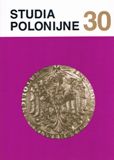Polscy lekarze zesłańcy 1863 roku na Syberii
Polish exiled medicine doctors of 1863 in Siberia
Author(s): Eugeniusz NiebelskiSubject(s): Cultural Essay, Political Essay, Societal Essay
Published by: Towarzystwo Naukowe KUL & Katolicki Uniwersytet Lubelski Jana Pawła II
Summary/Abstract: Two groups among political exiles of 1863 incessantly played the same ancillary role they had been given during the January Uprising – doctors and priests. The former ones took care of the bodies of their mates and of all their afflictions, and the latter ones – of their souls and of the psyches of those who had connections with religion and with the Church. The work of many of them resulted more from the sense of duty, vocation and mission – doctor's or religious – than from political reasons. Doctors were soon recognized as useful not only in Polish exile circles, but also in local communities. Polish doctors constituted nearly a half of the medical personnel in Cossack and military field hospitals, as well as in the ones affiliated to mines. The years of the Uprising and then of Tsarist repressions brought a new group of doctors and various medical specialists to the Russian Empire, and especially to Siberia. Many of them consolidated the good opinion about Polish doctors that had been entertained in those parts of the Russian Empire. Many Polish doctors stayed in Siberia, or generally in Russia, for a long time, and some stayed there for good, although the Tsar's amnesty of 1883 made it possible for all the exiles to return to Poland, to the European part of Russia, or to leave the Empire. Some of them had a career there and rendered great services to many fields of medicine. The most famous of them was Dybowski, whose career was well documented in historical literature. He devoted many years to exploring Siberia and to medical studies. At least 20 Polish doctors out of a group of 141 died in Siberia. At least 30 of them returned to Poland. Several are known to have brilliant achievements in the field of Polish medicine: Wacław Lasocki and Konrad Chmielewski extended the Nałęczów spa in the 1880s. Some, having come to Poland, were not able to find a place for themselves here and they returned to Russia. The article contains a list of names of Polish exiles who were connected with broadly understood medical services. It is an incomplete list compiled on the basis of historical literature, memoirs and fragmentary data found in record offices in Irkutsk and Chita.
Journal: Studia Polonijne
- Issue Year: 2009
- Issue No: 30
- Page Range: 69-114
- Page Count: 46
- Language: Polish

